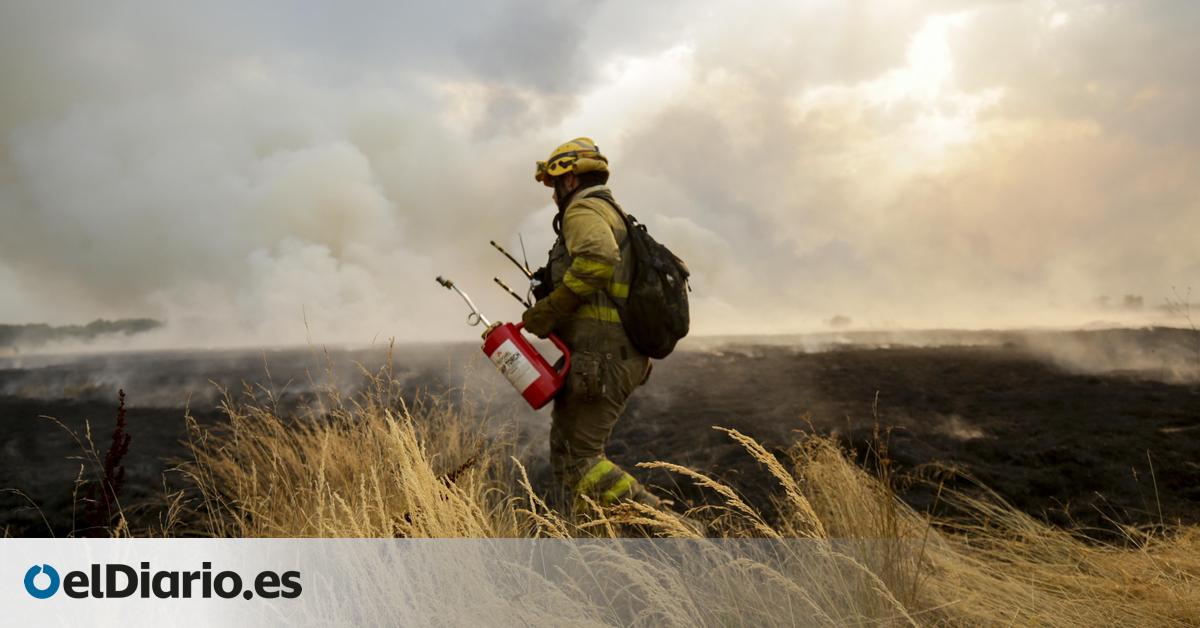
When the large forest fires arrive, more and more devastating for forests and people, the images of member firefighters that make marathon shifts in the middle of the chaos of the flames are repeated. They are called “pawns”, “operators” or “brigades.” The forestry did not even have even a common name in Spain. Nor, much less, similar working conditions, although in much of the territory they do share something: they have been crossed by precariousness for years. They earn salaries of just over 1,000 euros per month, they have temporary contracts limited to summer, when the risk is maximum, and work on services that are mostly subcontracted, through the private sector or management orders for public companies.
While Spain burns in one of the worst waves of fires that are remembered, the complaints of professionals accumulate. The unions in Castilla-La Mancha give the example of a firefighter who had to intervene in one of the active fires in the community for several days: “He has had to take care of the phone, the stations, the handling of the truck and the water load.” In the Leonese region of La Valdería, a group of neighbors went to the rescue of some brigades because neither aerial or land means arrived. A part of the operation – the minor – is made up of public workers, but most of those who are dedicated to extinction are for the salary of companies responsible for the land brigades (‘Romeo’) and the helitransported.
Ourense, who sees his mountains every year, also does not have enough means, according to a veteran environmental agent. The prevention and defense plan against the forest fires of Galicia (Pladiga) collects that by 2025 there are more than 7,000 people on the device, but “it is a lie.” In each brigade there should be seven workers, but many come to work with two, three or four firefighters because the casualties or vacations are not covered.
The half thousand of Madrid forest firefighters was in the middle of a dispute with the regional government when the spectacular fire of three songs exploded, which burned 2,000 hectares, killed a person and destroyed several homes. The area that burned was excluded from the plan against the fires of the Community of Madrid, according to Greenpeace. The troops, hired by the public company Tragsa, had been on strike to achieve salary improvements and that the necessary squares were covered throughout the year to take care of preventive work. Their salaries – in some cases just 1,200 euros of base – have been frozen for 15 years because their agreement has been updated since 2008.
There has also been a crisis in recent months in Teruel and La Rioja, where instead of hiring an own checkpoint, the regional government has ended up expanding the personnel in a privatized way. The hired people, finally, are less than those who promised.
It is paradoxical because statistics place Spain as a country with more number of firefighters than the European Union average. In 2023 there were 42,100, according to Eurostat. It is also a country where the body is very professionalized, says Federico Grillo, an expert in forest fires and vocal of the Official College of Forest Technical Engineers, compared to other nearby territories such as Portugal, which depend mainly on volunteers.
“Spanish operations are a chaotic amalgam, but at European level we are quite referents because we have very professional units. That does not remove the nuances: we start from a model of pawns with very precarious services that is improving little by little,” continues the engineer. According to his analysis, “we are in a transition” that hopes to lead to a “more stable situation.” There are also positive examples; communities that have advanced. Andalusia already has almost 300 forest firefighters hired all year since 2024.
Over the years, urban firefighters – not all cities have their own body, only the largest – have won a better recognition and salaries status, but evolution is much more erratic in the case of forestry.
Spain approved a basic law of forest firefighters a few months ago to order chaos. Communities and municipalities have until November of this year to adapt their regulations. Now you have to fulfill it. The law establishes a single category, that of “Forest Firefighter” and leaves behind 11 specialties that regulated the collective, UGT stands out. In addition, it advances in labor rights, such as the recognition of a reducing coefficient for retirement, and the occupational diseases associated with these workers will be studied.
“Lack of interoperability” among staff
The preamble of the norm recognizes that there is a “problem of disparity of material and human means, typologies of resources, professional training and qualification requirements” that causes a “lack of interoperability” among the personnel of different extinction services that have to work together before a fire.
So it is not only the number, but the coordination. “For the fragmentation it costs. Each one handles their own vocabulary and we must coordinate with those who do not know. In the end it seems that each one is within the walls of their administration. Improving this implies very important structural changes,” says Grillo, which regrets that the steps forward seem to notice anything because the fires are every time they are worse.
Apart from the firefighters of each community, the Ministry for Ecological Transition has the so -called forest fire reinforcement brigades (BRIF), Helitransported units specialized in extinction and that support the autonomous communities, especially when there are several simultaneous fires as now. The Emergency Military Unit (UME) has also been mobilized.
The majority of advances emerge with a tragedy coup: in 2022, a year of very serious fires in Spain, a royal decree of urgent measures was approved to “reinforce the coordination of all operations”. Three years ago, the Environmental Sector Conference, which brings together the Ministry and the Autonomous Communities, approved “strategic orientations for forest fire management”. This document warned that the imbalances between the budgets destined for prevention and extinction limited the “effectiveness” of public investments to deal with these phenomena.
The law also draws attention to the privatization of these services and establishes as “preferential” public procurement “to favor the stability of employment and the best attention to prevention and extinction.” Prevention, which is done outside the fire season, remains the great pending subject. Spain spends much more on turning off fires than to prevent occurring. “You must hire troops to work long seasons, do not short,” said the third vice president and minister for the ecological transition in an interview in the SER chain this Wednesday. The services must “professionalize and be operational 365 days a year,” said Sara Aagesen.
With information from the delegations of Eldiario.es in Aragon, Galicia, La Rioja and Somos Madrid.
Source: www.eldiario.es

